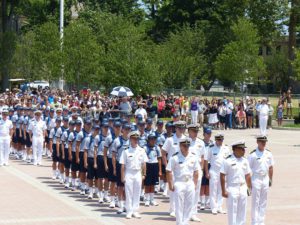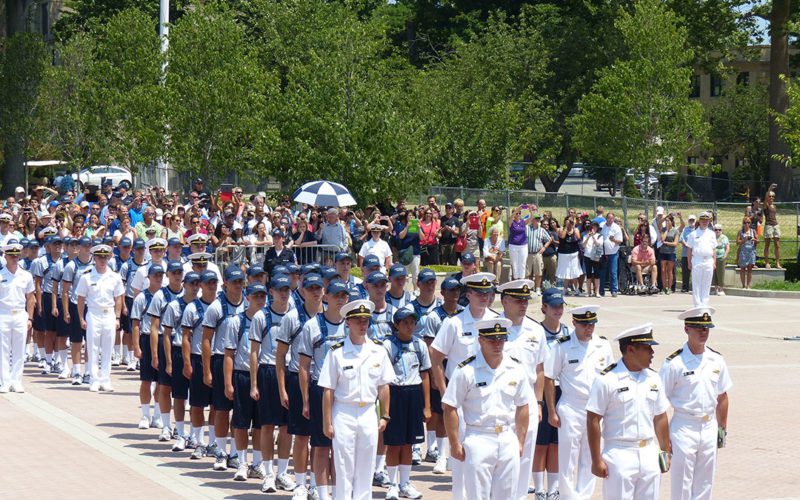
The U.S. Merchant Marine Academy (USMMA) must do more to combat sexual harassment and assault on campus, according to an independent consultant.
Those findings were included in a 274-page report released this fall by the National Academy of Public Administration (NAPA). The report also identified issues with the culture, facilities and academics at the Kings Point, N.Y., institution.
The U.S. Maritime Administration released the NAPA report two months after a cadet wrote anonymously about being raped by her male supervisor during Sea Year training. The allegation led to a temporary suspension of the Sea Year program pending new safeguards. The suspension remained in effect at press time.
The report’s authors found instances of assault and harassment continued to go unreported at the USMMA. And while the academy has enacted new measures to prevent abuse and harassment, the effectiveness of these programs has not been measured.
“The academy community as a whole has yet to embrace the idea that zero tolerance of (sexual assault and harassment) within the community is and should be a reachable goal,” the report said.
Congress ordered the USMMA assessment in the 2020 National Defense Authorization Act. NAPA, Congress’ quasi-independent agency for counsel on government reform, identified dozens of recommendations for the college, which has about 1,125 students.
“The findings and recommendations of this report address longstanding issues that put the safety and health of the midshipmen and the entire USMMA community in peril,” Teresa W. Gerton, NAPA’s president and chief executive officer, wrote in the report’s foreword.
The report also highlighted problems with the academy’s facilities, many of which are described as outdated and in need of maintenance. It also called on the USMMA to modernize its academics and curriculum to prepare students for a successful maritime career.
The report’s section on sexual assault and harassment took new urgency following the Sept. 27 post by “Midshipman X” on a whistleblower website. The female cadet described her rape aboard a Maersk ship when she was a 19-year-old cadet. Her attacker, she wrote, cajoled her into not reporting the rape, telling her no one would believe her.
Maersk has not publicly identified the ship, but it has launched an investigation based on her allegations. The company suspended the captain and four crewmen from the ship she served aboard.
Her post also implicated USMMA culture, which has faced scrutiny for years over its treatment of harassment and sexual abuse. The author wrote about becoming a victim advocate on campus, where she heard from other students reporting cases of sexual assault.
She said an academy employee urged her not to include her victim advocacy on her resume, and recalled how USMMA Superintendent Jack Buono told her sexual misconduct was not occurring under his leadership. Details of these conversations could not be confirmed.
The DOT suspended Sea Year amid the fallout from Midshipman X’s post. Six members of Congress called for Buono’s resignation.
The USMMA declined to comment on criticism of Buono’s leadership. It also would not address impacts from the Sea Year suspension on existing students.
Sea Year training dates back to 1942. It pairs two USMMA students and places them aboard U.S.-flagged commercial or government ships during their sophomore and junior years.
The report found the academy’s sexual assault prevention and response program lacks the capacity to develop, implement, operate and assess its policies and programs. One reason is that the USMMA has few models to borrow from, as it is a unique institutional structure that blends elements of a traditional college and military academy.
“As a result,” the report stated, “[the] USMMA has had to write policies and procedures, develop a training regimen and establish a disciplinary system independently.”
Members of its Sexual Assault Prevention Response Office, established in 2005, “typically have had minimal to no previous experience working with college students or within a higher education environment,” the report notes.
The academy’s approach to these issues were revisited following a 2016 crisis over sexual assault and harassment allegations that also caused a temporary suspension of the Sea Year program.
The report acknowledged the academy has made progress improving diversity and addressing campus culture and sexual harassment and assault. But it also called for yet another round of reassessments of sexual harassment policies from the DOT and the U.S. Maritime Administration.
Judith Youngman, interim director of the U.S. Coast Guard Academy’s Center for Maritime Policy and Strategy, and the chair of the panel who wrote the report, acknowledged these “issues at USMMA are long-standing and stubborn.”
Youngman wrote that “the key takeaway is that without permanent increases in financial resources and staff capacity and capabilities, it is unlikely that USMMA will have the resources that it needs.”

